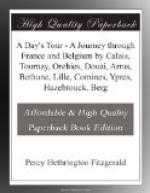Coming out, I find it broad day. A few natives with their baskets are hurrying to the train. I note, rising above the houses, two or three other solemn spires and grim churches, which have an inexpressibly sad and abandoned air, from their dark grimed tones which contrast with the bright gay hues of the modern houses that crowd upon them. There is one grave, imposing tower, with a hood like a monk’s. Then I wander to the handsome triangle-shaped place, with its statue to Margaret of Parma—erst Governor of the Netherlands, and whose memory is regarded with affection. Here is the old belfry, which has been so clamorous, standing apart, like those of Ghent, Dunkirk, and a few other towns; an effective structure, though fitted by modern restorers with an entirely new ’head’—not, however, ineffective of its kind.
The day is now fairly opened. There is a goodly muster of market-women and labourers at the handsome station, which, like every station of the first rank in Belgium, bears its name ‘writ large.’ It is just striking five as we hurry away, and in some half an hour we arrive at ORCHIES—one of those new spick-and-span little towns, useful after their kind, but disagreeable to the aesthetic eye. Everything here is of that meanest kind of brick, ‘pointed,’ as it is called, with staring white, such as it is seen in the smaller Belgian stations. Feeling somewhat degraded by this contact, I was glad to be hurried away, and within an hour find we are approaching one of the greater French cities.
VI.
DOUAI.




